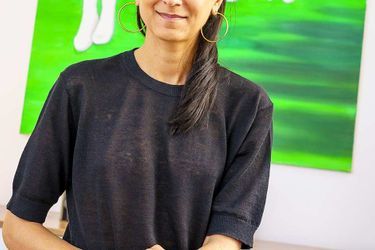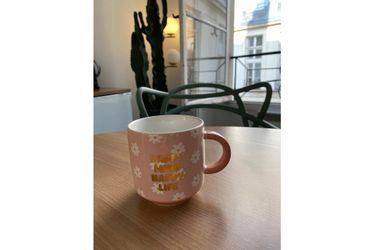For six years, Negar Haeri has represented Mohammed Amri. A few days before the verdict of the trial of the attacks of November 13, we met her in her office.
She welcomes us into a bright, modern meeting room, with a painting on the wall inviting interpretation: children’s feet at play or the legs of hanged men? Be that as it may, it is above all the colors of Iran that are obvious and which recall the origins of our interlocutor: Negar Haeri, one of the defense lawyers who has been working since last September before the assize court specially composed in charge of the so-called “V13” trial, on the attacks of November 13, 2015. The young woman, assisted by Xavier Nogueras, represents Mohammed Amri.
It was chance that put this 34-year-old Belgian-Moroccan on his way in July 2016. Secretary of the Conference, a prestigious eloquence contest won in 2014, she still carried out some duty during this period which allowed her to be assigned as a court-appointed lawyer in priority on criminal or terrorist cases. And during one of these days, Negar Haeri finds himself face to face with a “hooded man, surrounded by 15 hooded and armed escorts”, an “impressive” logistics for the one who was arrested on November 14, 2015, a few hours after his return from Paris where Salah Abdeslam had called him to pick him up.
It is a “completely stunned” client that the young criminal lawyer discovers: “When we have someone like that in front of us, we are just sorry for the situation in which he is, whatever he has done. Few people would have been uncomfortable reaching out to him at this time. I tell myself that he is too overwhelmed by events for us not to start by listening to him, believing him a little bit. I think the future proved me right: the more time passed, the more I was convinced of his innocence for some of the facts. Mohammed Amri has always assured that he knew nothing of the terrorist projects of November 13, 2015, simply acknowledging that he had brought Salah Abdeslam from Paris to Brussels and had dropped him off a few months earlier in front of a car rental box – without suspecting it, swears he, that this vehicle would be used to transport future suicide bombers from the Bataclan and the Stade de France.
To read : Bruno, survivor of the Bataclan: so that joy returns
“She did law surgery”
Mohammed Amri faces up to 20 years in prison and for the past year, Negar Haeri has devoted all his time to his defense and has done his utmost in his pleading to legally dissect the charge of association of terrorist criminals to seek acquittal on this point, the heaviest in his client’s file. “As she does things 100%, she really entered this trial with the intensity and all that comes with it, the stress, the doubts but also the energy, working a lot”, confirms her colleague Sabrina Goldman . “When I arrived in the morning, she had often been there for a few hours to work. She lives with this trial and, from the start, the objective of the defense that had to be built up, built up to the pleading. A perilous and essential exercise, which Sabrina Goldman found “perfectly successful”: “She performed surgery on the law and made it relevant, with complicated legal concepts such as intent and guilty will. She made them intelligible, concrete and she explained their meaning.”
Mohammed Amri testifying before the specially composed Assize Court of Paris, in November 2021.
© Benoit Peyrucq / AFP
“I put myself under a bell, I only did that and it was the only way to derive some satisfaction from it. It was necessary that all my attention be mobilized on this trial and it was the best way to manage the stress. Everything that was unreasonable: the stage fright, the anxiety, I had to neutralize it through work, ”explains the one who chose law after six years at the Geneva Conservatory from where she hoped to launch a career as a pianist. Years of music, since she was 5 years old, which are still beneficial to her today: “I am less of a tracker than others, but I have experienced it so much in my life, with auditions, concerts or exams that I ended up learning how to handle it. And the piano requires rigor and a very strong sense of precision, a sense of observation. It develops important qualities that school cannot develop: a sense of observation, precision, awareness of the importance of a detail. When we know to what extent a small natural, a small flat or a sharp on a score changes the whole color of a musical extract, we become aware of the importance of these small signs. The fact of being educated in this leaves traces on the rest.
“Where there were challenges, I went head first”
However, she discovered a vocation as a lawyer late in life, entering university at the age of 23 almost by chance. “At that age, I didn’t have many choices,” she admits. It was not so much her lawyer big brother – as their younger brother would be after them – who inspired her as a personal quest: “The challenge was to enter an area where I had really had a complex since childhood. When I’m weakened, I lose my words. There is an instinctive belief that my vocabulary is not yet sufficiently developed and supplied. Maybe because my mother tongue is Iranian and I learned French at school,” she guesses, remembering the days spent enriching her vocabulary, learning definitions by heart. “I rebuilt my French, my vocabulary, my oral expression, from my years of law. Where there were challenges, I went head first, knowing it was going to hurt. There were speech contests in college. The idea each time was to build the language gradually. It was an active and positive effort.”

Negar Haeri in his Paris office, in June 2021.
© Philippe Petit / Paris Match
And she found this element in her client, precisely met thanks to his victory in an eloquence contest. “What touched me a lot is that he has a problem with language. And what pleases me today is that after nine months of trial, his oral expression has become much better,” she says. “If he can have at least won that for all those tough years, that makes me happy. I have forged bonds of trust and genuine sympathy with him. It hasn’t been easy but I think it’s mutual.” Mohammed Amri, who calls him “regularly” in the evening, is one of the few defendants in the case who has not changed lawyers since the start of the case.
“We all knew there was something transcendent that united us”
Another file has caught her attention in recent months: she defends the parents of young Shaïna, a 15-year-old teenager murdered in Creil in 2019, after being the victim of a sexual assault two years earlier, for which three young men were sentenced earlier this year to terms ranging from 8 months to a year in prison. “I was able to see how the judicial system had failed in certain respects in its duties. I am angry enough to try to participate to my extent to try to improve things”, explains the lawyer, aware that it can be “very surprising to have the defendant in the worst case and the victim in an absolutely terrible affair”. “But I was almost happy to have both at the same time because one reminded me of how difficult it was to be in the position of the other.”
This humanity led to an astonishing consequence during the nine months of hearings. Sophie Parra, injured at the Bataclan, is a civil party to the trial. This Lyonnaise came to Paris for a few hearings and testified before the Assize Court, but follows via the web radio set up the rest of the trial. The young woman, who does not have her tongue in her pocket at all to comment on the hearings and in particular the defense lawyers, “really hit it off right away” with Negar Haeri: “Among all the lawyers, it is the one that’s the least unbearable, she says jokingly. With Amri, I found her both super authoritarian and super nice, it always made me laugh. During a hearing with Belgian investigators, she got really upset and I tweeted quoting her, saying she needed some chamomile.” From this joke was born a gift: a packet of herbal tea and a mug, which the lawyer keeps in the office and uses. “A really unique moment”, greets the criminal lawyer. “It’s as if we were animals who scrutinized each other, who sometimes wanted to get closer. We all knew that there was something transcendent that united us and we sometimes wanted it to happen. Sometimes we just wanted to thumb. We are not against you on the pretext that we are defending the accused. Those moments happened and it’s amazing. Rules of natural fraternity have been applied at all levels: between the accused and the defense lawyers, the lawyers for the civil parties and those for the defence, the defense lawyers and the victims, sometimes even between the victims and the accused”, lists Negar Haeri.

The mug offered by Sophie Parra to Negar Haeri.
© Kahina Sekkai
After a historic trial, the return to everyday life
In this rapprochement, both see one of the virtues of this historic trial, moments of humanity necessary at the end of difficult and sometimes stormy hearings: “When we go out, we find ourselves among people. There is no longer this side of being on the right or wrong side of the bar. We discuss, we laugh and I think it feels good after tense hearings, to tell ourselves that we can let go of the pressure even if the subject is hard and the trial serious… get out of the palace and tell ourselves that we laughed. I couldn’t have spent ten months being angry all the time and you realize you can’t hate them all. All this human side, I would not have believed that it could come out of such a trial, ”adds Sophie. “At the start of the trial, I would not have thought of offering tea to a defense lawyer. But after nine months, by dint of hearing them every day via web radio, the fact that she answers me when she was not obliged to do so, her extremely human side touched me. I sent him a little message after his pleading, I found it great. She always had a nice little word, it created bonds.
After this historic trial, will come the return to daily life, which some civil parties fear as the verdict draws closer. The fear also exists in the lawyer, even without having experienced the trauma of the attacks: “You really have to imagine that we were under a bell that is withdrawing and that we will have to resume a normal life. It will take time to adapt, the files will come back and it will be a very important parenthesis in our lives, ”projects Negar Haeri. “We will have to reinvent ourselves at the start of the school year”.